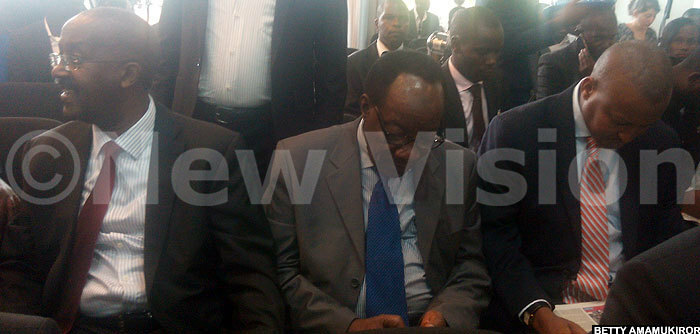As it happened: Election petition hearing
Hearing of the poll petition continues Tuesday after court is adjourned.
At Supreme Court
- Election petition hearing kicked off on Monday
- Supreme Court also to made ruling on CSOs and MUK dons seeking to join the petition as "friends of court"
- Makerere dons' application was accepted, CSOs' was rejected
- EC boss Eng. Badru Kiggundu was cross-examined
- Court was adjourned until Tuesday morning
4.15pm: Till then!
And that brings us to the end of this commentary page for today. Be sure to be with us again tomorrow morning. Same place.
Good evening and stay safe.
Oh, and if you are not super terrified of blue birds, tweet me using @joekizza
Am outta here!
|
4.10pm: Court adjourned Well, well. We will not go on up until 7pm local time as the Chief Justice had warned earlier today, in case the need arose. There are still plenty of things to be fulfilled. Look at it as trying to fit square pegs into round holes, or vice-versa. 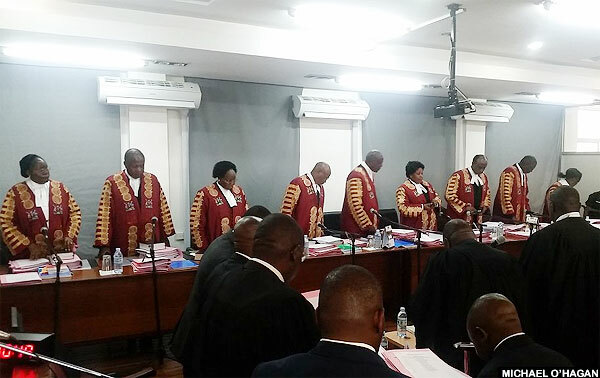
|
4.00pm: 'Wasting time'
Chief Justice Katureebe says: "It's futile to proceed with Counsel [Mbabazi] making references to documents that court does not have. This is wasting time, by ambushing court's time with unknown information."
3.55pm: 'Trial by ambush'
"This is a trial by ambush," says Chief Justice Bart Katureebe on late filing of documents by Amama Mbabazi's legal team.
He goes on to make it clear that they will not accept affidavits filed after the deadline. "You are ambushing the court and all parties," he tells Counsel Mbabazi.
The Chief Justice rejects a rejoinder from the petitioner filed before the cross-examination of Electoral Commission boss Eng. Badru Kiggundu. He says court rules must be followed.
3.40pm: Question of compliance
"When it came to announcement and declaration, the documents in Section 56 were not there," says Counsel Mbabazi as he goes on to highlight sections of the Presidential Elections Act that petitioner Amama Mbabazi says the Electoral Commission did not comply with.
Meanwhile, while many have glued their attention to the subject matter, others are scanning a little more outside the box . . .

|
Ladies and gentlemen, court is back in session. Just to remind you that it is a hearing of an election petition by Amama Mbabazi under way at the Supreme Court in Kampala.
|
3.00pm: Feed your eyes
After filling your bellies with some good lunch, how about now feeding your eyes with what our roving camera captured at the Supreme Court today . . .
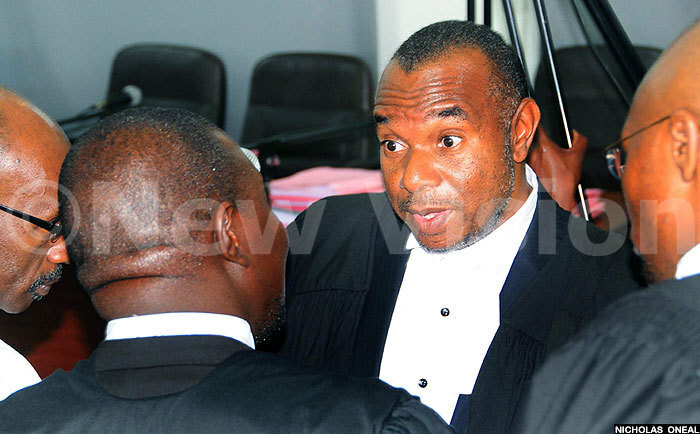
Amama Mbabazi's lawyer Mohammad Mbabazi (centre) is seen here in court mingling with colleagues
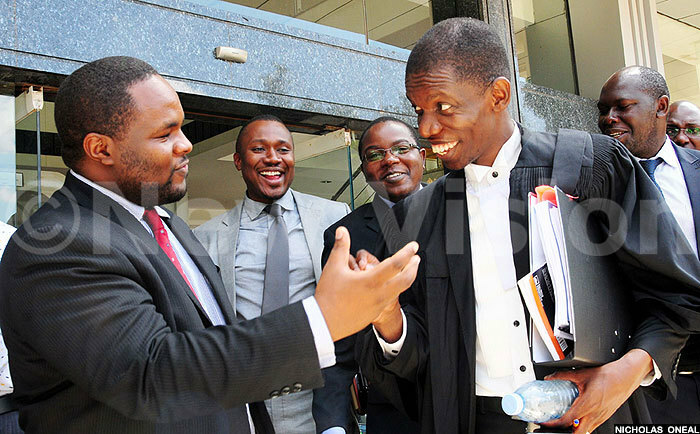
Lawyer Robert Kirunda chats with Dr Kabamba Busingye after the court's ruling on the "friends of court" applications
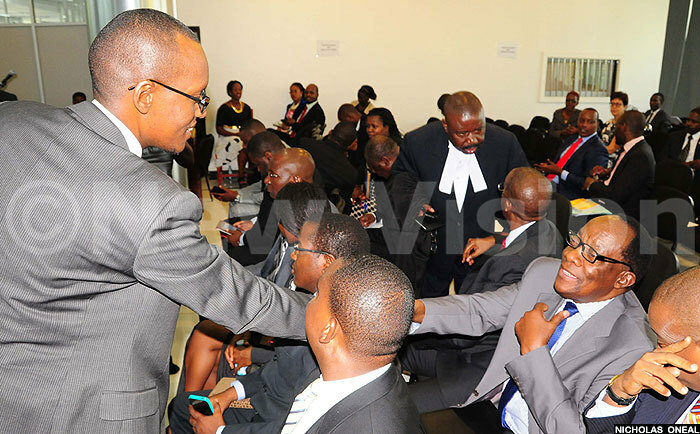
Inside the packed courtroom, Electoral Commission chairman Eng Badru Kiggundu greets President Museveni's lawyer Edwin Karugire
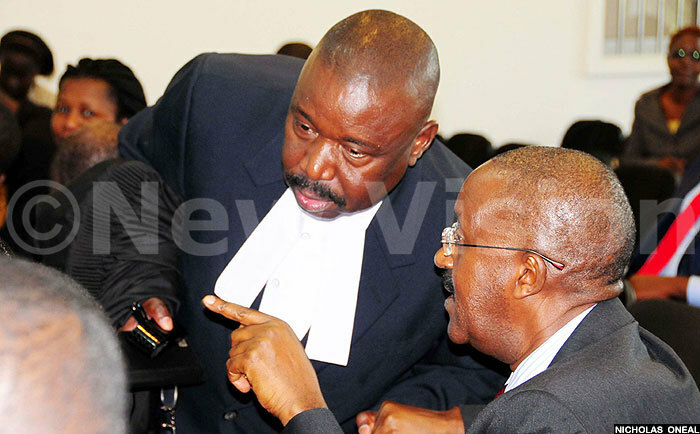
Electoral Commission Secretary General Sam Rwakoojo (right) appears to be telling Deputy Attorney General Mwesigwa Rukutana something in court
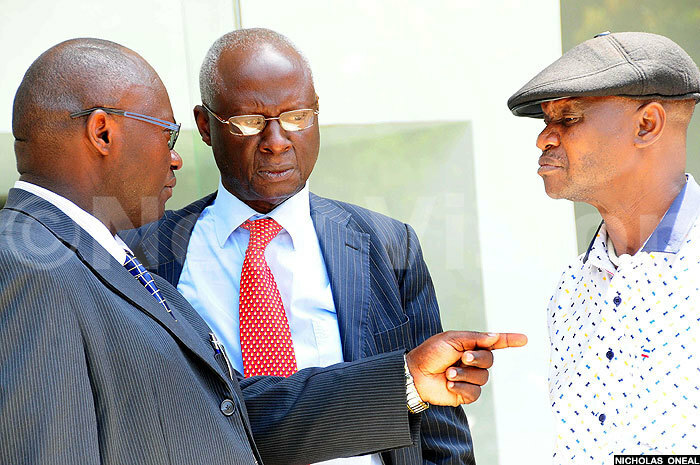
Executive Director Foundation for Human Rights Initiative Livingstone Sewanyana (left) with former spy chief David Pulkol (right) and UPC vice President Joseph Bossa (centre) after court rejected an application by CSOs to join the poll petition as "friends of court"
|
2.40pm: In other news . . .
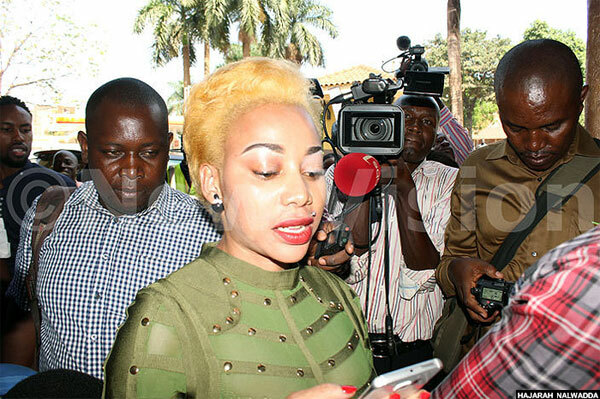
|
|
It's lunch time people, and since most of you find the courtroom one heck of a sleeping pill, we'll save you from much of that misery. The Supreme Court has adjourned until 3.15pm. One man who will need that rest is Eng. Badru Kiggundu. He has been under cross-examination for almost two hours straight.
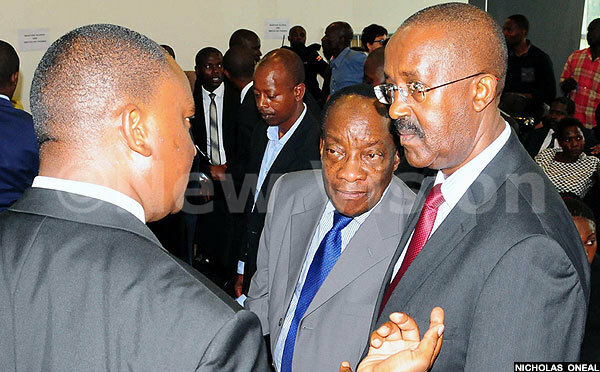
|
1.50pm: De-registration
So how does one get de-registered, another of Mbabazi's legal team member, Counsel Asuman Basalirwa, asks Kiggundu, who says de-registration happens after voters report that either someone left the country or died and such a claim is verified as truth.
Basalirwa does not stop there and goes on to wonder whether DP president general Norbert Mao was de-registered through the elaborated process.
But before Kiggundu takes the trouble to negotiate around that question, Chief Justice Bart Katureebe intervenes, saying Mao's de-registration is not a matter before court: "I don't see the relevance of that."
Counsel Basalirwa is, however, resilient. The law says the Electoral Commission will "compile, maintain, revise and update the national voters' register, so where does retire come from?"
Kiggundu responds: "There are functions that we derive from the broader interpretation of the law. It's not black and white."
The EC chairman is further asked to explain more on what happens when the national voters' register is retired.
He says the 2001 voters' register was retired and de-gazetted because it was partly handwritten and typed out. Then, the 2006 one was retired to adopt another register yielded through biometric technology.
1.40pm: 'Where is the data?'
Mbabazi lawyer Asuman Basalirwa asks: What happened to the data of the national voters' register that you retired?
Kiggundu responds that it is in the archives. "This was not first time we retired a register. In 2005 and 2006, we retired registers to keep up with technology. We retired the previous register due to substantial improvements with the coming of biometrics."
"Right now, we are not registering new voters but as we get into by-election syndrome, there'll be an opportunity," reveals Kiggundu, adding that registration of those seeking to be added to the voters' register comes after public announcements.
1.35pm: No access
Amama Mbabazi's lawyer Mohammed Mbabazi gives way for his counterpart Severino Twinobusingye, to carry on with the cross-examination of Electoral Commission boss Eng. Badru Kiggundu.
Meanwhile, Kiggundu says that agents did not have access to scanned declaration of results (DR) forms that were transmitted.
1.28pm: 30 seconds . . .
. . . not to the end of the hearing, you folk! As I mentioned earlier, going into the break, Chief Justice Bart Katureebe made it clear that this hearing, if need be, will go for hours. So, don't you think we've got only 30 seconds left.
Well now, here's the thing:
Kiggundu says that it took only 30 seconds for voters to be verified, as opposed to the widely claimed two minutes.
Within 30 seconds, a voter said his or her name and they were verified by the biometric machine, he tells court.
1.25pm: 'I apologized'
Electoral Commission boss is still going strong inside the dock. He now has to respond to the delays of electoral materials to get to some polling stations.
Kiggundu: "Apart from Kampala and Wakiso, majority of areas received voting materials in time. Kampala and Wakiso received materials late and I apologized from the bottom of my heart."
He adds that although materials arrived late in these two areas, more than 50% of voters voted, thanks to the extension provided (beyond the official 4pm end of polling time).
1.15pm: 'You are over-tasking my brain'
"Was the old national voters' register retired? Counsel Mbabazi asks Kiggundu from across the room.
"Yes," says Kiggundu, and goes on about how "we sat with government and decided to use the national ID [identity card]" and do away with the voters' card. He says that the national ID was considered multipurpose.
Mbabazi then asks the EC boss when the national voters' register was gazetted and here's what he responds: "You are over-tasking my brain. I can't remember the date but it was done in time."
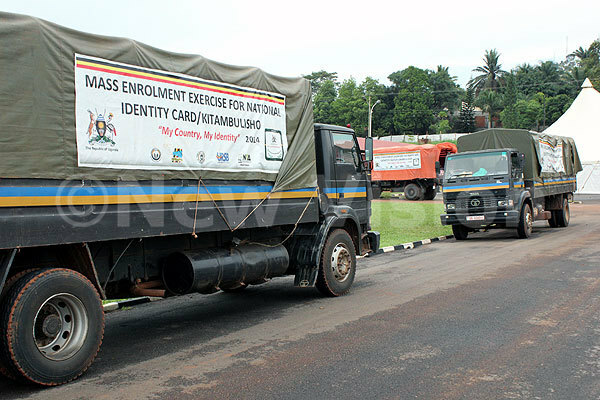
Vehicles carrying materials to be used for a mass enrolment exercise for the national identity card parked at Kololo airstrip in April 2014
1.03pm: 'I want scanned DR forms'
"The documents I shared with you are the foundation of the announced results," says Eng. Kiggundu.
"I want the scanned DR [declaration of results] forms," demands Mbabazi's lead lawyer Mohammed Mbabazi.
"When do you want them? They're on various servers," responds Kiggundu, who has been standing in the witness stand all this while since coming back from the break.
12.52pm: 'Where is the transparency?'
Shouldn't a system which is capable of dealing with multiple voting also be able to generate results? Counsel Mbabazi asks, to which comes Kiggundu's response:
He says that funding constraints came in the way of the Electoral Commission to acquire machines that can provide results.
"If you don't have the number of verified voters, then where is the transparency needed from the machines?" presses Mbabazi [just to remind you that this is not Amama Mbabazi, the petitioner; it's his lead lawyer Mohammed Mbabazi].
The Electoral Commission chairman says biometric machines that can provide the total number of the people verified should be highly considered in the future.
12.45pm: Biometric machines
Kiggundu is also questioned on the biometric voter verification machines. He says he is not in the know of the exact number of people who were verified by these machines. The EC boss adds that the biometric voter verification machines were not designed to provide the number of people verified.
Meanwhile, Mbabazi's lawyer Mbabazi reasons that the biometric voter verification machines store data on their SD cards.
"There are some people who voted without being verified by the biometric machines. Please don't make me lose my head," says Kiggundu, to which Chief Justice Bart Katureebe quips: "Please don't lose your head. No one wants it."
Many people find court proceedings boring, but what a way to stir those in this packed courtroom!
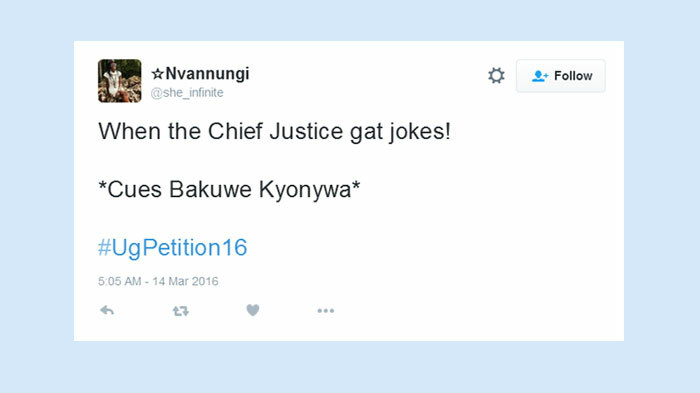
12.32pm: 'Done under the law'
Kiggundu goes on on the matter of DR forms: "If you had agents at every district level, you would have had DR forms. I have information that at almost 50% of polling stations, the petitioner 9Amama Mbabazi) did not have agents."
"The DR form was signed by the presiding officer and was supposed to be signed by your agent. In some cases, the agent did not sign," says the EC boss, who adds that all Electoral Commission actions were strictly under the law "as it is".
He is also keen to say that signing on declaration of results (DR) forms at district and national tally centres is not provided for in the law.
12.25pm: 'Uganda's process like Ghana's'
The Chief Justice Bart Katureebe says that Kiggundu, who is a witness, was clear when he said he is not a lawyer and that lawyer Mohammed Mbabazi had moved away from law questions.
Deflecting another barb coming his way, Kiggundu says he didn't reinvent anything, and is keen to emphasize that Uganda follows the same electoral process as Ghana's.
Going on, Counsel Mbabazi insists they asked for the list of the first 580 polling stations that made the first provisional announcement at the national tally centre at Namboole. But the Electoral Commission lawyer Tumusiime maintains that they availed all the information asked for by Mbabazi's legal team, including the DR forms and tally sheets.
"Even those 580 polling stations are contained in the information we provided," he adds.
12.15pm: The process
The EC chairman then breaks down the process through which results are arrived at from electronic form to hard copy:
"The declaration of results (DR) forms are read out to the candidates' agents and the audience before transmission," he explains. Then the presidential candidate's agents check the DR forms before the results are transmitted, says the EC boss.
Tally sheets are scanned and emailed to the Uganda Electoral Commission. They are not screened due to financial contraints, he adds.
Around this time of questioning, Electoral Commission lawyer Enos Tumusiime asks court to protect Kiggundu as he is being asked legal questions yet he is not a lawyer.
12.10pm: 'The truth and nothing but the truth'
The Supreme Court allows petitioner Amama Mbabazi's lawyers to question Electoral Commission chairman Eng. Badru Kiggundu, who duly steps forward and stands in the witness stand.
With a Qur'an in his right hand, Kiggundu will first take an oath . . .
"In the name of Allah, the evidence I'll give shall be the truth and nothing but the truth."
After saying the oath, first, he is asked whether the documents inspected by the petitioner are the same ones he used to announce the presidential results on February 20 (last month).
The EC boss recounts the tallying process right from the polling station, going on to say that the declaration of results (DR) forms leave polling stations in a tamper-proof envelope and that they are scanned at district headquarters.
11.55am: We're back
It's hot, it's hot and it's hot. What a way to start the week! If you are feeling the heat as much as I am, don't worry, we are in it together.
Okay it's a couple of minutes to noon and the Supreme Court is back in session after a half-an-hour's break.
11.25am: Short break
Well, well, well. So now that we know the outcome of the applications by the nine Makerere University dons and eight CSOs, it's high time we got to the main course of the day: the election petition hearing.
But hold it there . . . first, the Supreme Court will go for a short break. And that should allow you some time to catch an orange (I will do two) or a glass of water.
Meanwhile, you should brace yourself for a long day today here in court, especially if you are to go by Chief Justice Katureebe's earlier warning: "Where need be, we may go beyond 7.00pm," he said a little while ago.
Katureebe also calls "unacceptable" the petitioner's legal team's continuation to file affidavits.
"Are you following the court schedule or your own schedule?" he asks.
Court breaks off briefly
|
However, it is a whole different outcome for the CSOs.
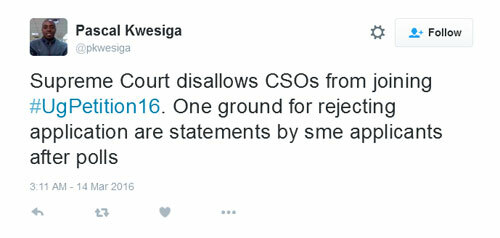
|
|
"We are satisfied that the applicants' brief raises novel issues and their participation would aid the court," rules Justice Tibatemwa. The "friends of court" will now have to file a written brief to the court.

|
10.55am: 'We are satisfied'
Justice Tibatemwa is reading out their ruling on the two amicus curiae applications by Makerere University dons.
"We are satisfied that applicants have expertise in issues such as human rights and good governance," she says. "While impartiality is key, it is not the only issue in determining amicus curiae." She goes on to assure that the Supreme Court will ensure that applicants don't overstep their amicus brief.
Remember that there are nine MUK dons and eight CSOs interested in joining the petition.
|
10.50am: 'Very concerned'

|
10.45am: Media 'sensational'
Deputy Attorney General (AG) Mwesigwa Rukutana takes to the mic and starts off by pointing out how the media is sensationalizing the proceedings. It is "sensational and intended to arouse anxiety", he says. He says that when former Prime Minister Amama Mbabazi's legal team appeared to amend the petition, media reported it as Mbabazi having won "Round One".
|
Finally, the nine justices make appearance inside the courtroom and ease into their seats. Chief Justice Bart Katureebe honorably starts off by apologising for the late start of proceedings. We are under way ladies and gentlemen. |
|
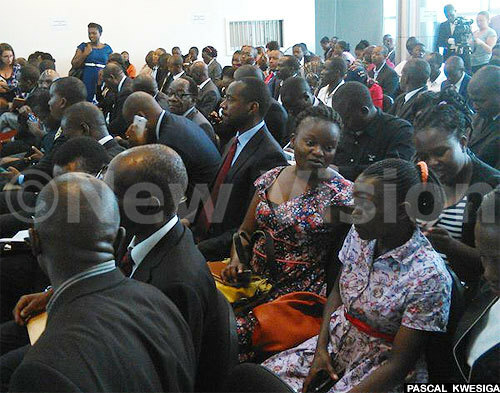
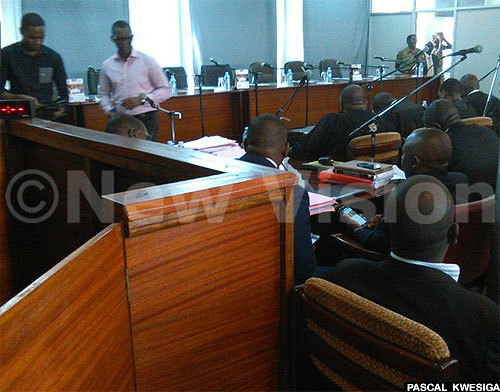
|
10.18am: 'We want in'
Nine Makerere University dons and eight civil society organisations (CSOs) are seeking to join the petition by Mbabazi as "friends of court".
The CSOs are:
- Foundation for Human Rights Initiative
- Uganda Association for Women Lawyers
- Foundation for International Development (FIDA)
- Chapter Four Uganda
- Human Rights Network, Uganda
- Kituo Cha Katiba-eastern African Centre for Constitutional Development
- Legal Service Providers
- Transparency International
|
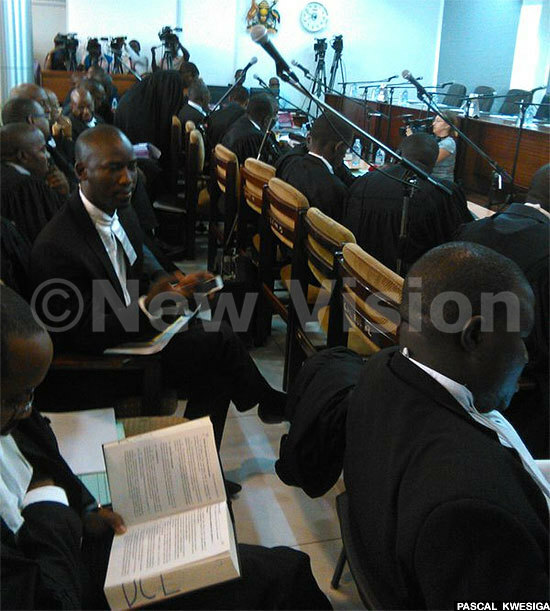
|
9.30am: Here we are again
Good morning!
Today, the Supreme Court is due to start hearing an election petition by former Prime Minister Amama Mbabazi. The court is also expected to make a ruling on whether civil society organisations (CSOs) and Makerere University dons should be allowed to join Amama Mbabazi's election petition as "friends of court".
Electoral Commission (EC) chairman Eng Badru Kiggundu, donning a grey suit and a blue neck-tie, is already at the Supreme Court.
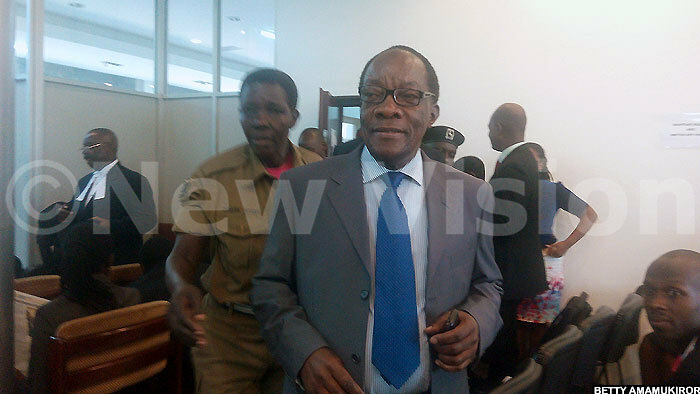
Infact, the EC boss, as pictured here, is flanked by EC secretary Sam Rwakojo (left) and EC spokesperson Jotham Taremwa (right) for the inaugural hearing of the poll petition
